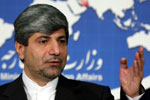 AP: An Iranian spokesman on Tuesday said the country’s nuclear talks with world powers yielded “positive results” and assailed what he described as “negative” remarks by some Western officials following those negotiations.
AP: An Iranian spokesman on Tuesday said the country’s nuclear talks with world powers yielded “positive results” and assailed what he described as “negative” remarks by some Western officials following those negotiations.
The Associated Press
By By NASSER KARIMI
 TEHRAN, Iran (AP) — An Iranian spokesman on Tuesday said the country’s nuclear talks with world powers yielded “positive results” and assailed what he described as “negative” remarks by some Western officials following those negotiations.
TEHRAN, Iran (AP) — An Iranian spokesman on Tuesday said the country’s nuclear talks with world powers yielded “positive results” and assailed what he described as “negative” remarks by some Western officials following those negotiations.
According to Ramin Mehmanparast, some Western officials and media outlets are trying to portray the results of the talks last week in Almaty, Kazakhstan, in a bad light because of their own political agenda.
“It is a matter of surprise that some Western and regional countries as well as their media outlets are trying to cast a negative image on the talks, which had positive conclusions,” said Mehmanparast, the Foreign Ministry spokesman.
He said the Western officials, whom he did not name, were doing this “based on their political viewpoints.” He did not elaborate but said the negotiations on Iran’s controversial nuclear program could reach a “mutually acceptable conclusion, gradually.”
U.S. Secretary of State John Kerry warned on Monday in Riyadh, Saudi Aabia, that the window of opportunity for a diplomatic solution on Iran’s nuclear activities “cannot by definition remain open indefinitely.”
Kerry said that “talks cannot become an instrument for delay that will make the situation more dangerous.”
The Obama administration is pushing for diplomacy to solve the impasse over Iran’s nuclear program but has not ruled out the possibility of military intervention in Iran to prevent it from acquiring an atomic weapon.
Off-and-on talks between Iran and the world powers — the United States, China, Russia, Britain, France and Germany — began after the six offered Tehran a series of incentives in 2006 exchange for a commitment from Tehran to stop enrichment and other activities that could be used to develop weapons.
The Almaty talks were the first since negotiations stalled last May after a round in Moscow. The next round will also be held in Kazakhstan in April, after an expert-level meeting in Istanbul, Turkey, later in March.
Tehran maintains it is enriching uranium only to make reactor fuel and medical isotopes, and insists it has a right to do so under international law. It has signaled it does not intend to stop, and U.N. nuclear inspectors recently confirmed Iran has begun a major upgrade of its program at the country’s main uranium enrichment site.
On Tuesday, Mehmanparast also reiterated Iran’s long held stance that Tehran is ready to remove concerns over alleged military dimensions of its nuclear program if its rights to develop nuclear energy are recognized by the U.N. nuclear watchdog, the International Atomic Energy Agency.
The visits by the IAEA inspectors to Iran are separate from the talks with world powers over the nuclear issue but Mehmanparast tied the two together, saying that “sets of our talks” with the IAEA and the world powers “can be related … if the actions are mutual.”
“Our meetings with the IAEA are aimed at achieving a comprehensive framework that could approve our (nuclear) activities, based on the non-proliferation treaty,” said Mehmanparast.
The head of the U.N. agency, Yukiya Amano, on Monday urging Tehran to grant his inspectors access to a site where the IAEA thinks Iran may have carried out experiments linked to nuclear weapons development.
Iran denies any such work, and insists the site known as Parchin is a conventional military complex.
The IAEA has tried for more than a year to visit Parchin and Amano told the 35-nation IAEA board Monday that without more Iranian cooperation, his agency “cannot conclude that all nuclear material in Iran is in peaceful activities.”
“We will follow up with actions to remove those concerns,” said Mehmanparast.


